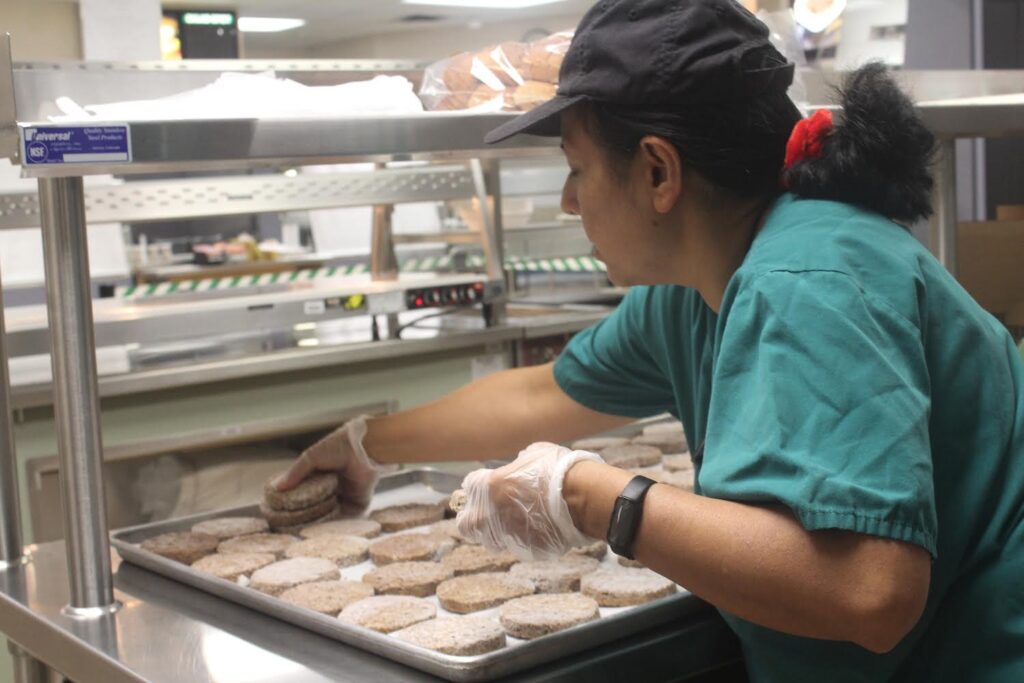Nutrition staff makes the impossible, possible

Laurel Wang | The Chronicle
The Mason High School (MHS) cafeteria has achieved the impossible with its vegetarian menu.
The Impossible Burger made its debut on September 14, adding the burger as a permanent vegetarian lunch option. Made with vegan ingredients, the Impossible Burger attempts to mimic the taste and texture of real beef.
The addition of the Impossible Burger is part of an expansion to accommodate the diverse dietary needs of MHS students. With growing interest in vegetarian and vegan diets over the past few decades, sales of plant-based products outpaced the growth of the overall food industry in 2021.
As more students explore different diets, the demand for vegetarian and vegan meals has increased. In her nineteen years working in the cafeteria, MHS Kitchen Manager Lisa McDonald has overseen the expansion of the menu to include vegetarian and vegan options. In the past, students’ options were limited to a handful of meals.
“For vegetarian students, we would have a yogurt parfait, peanut butter and jelly sandwich, salad, and spicy black bean burger everyday,” McDonald said. “For vegans, we basically had nothing.”
The burgers have proved popular, with sales of the Impossible Burger surpassing the original vegetarian option of black bean burgers. Cafeteria staff now prepare 50 Impossible Burgers daily, up from the ten burgers they prepared on the first day. MHS students are increasingly choosing to follow different dietary guidelines, whether it be for cultural, ethical or health reasons.
Sophomore Vandan Mistry practices Hinduism and follows a Sattvic diet with a set of religious dietary principles. Under the Sattvic classification, foods carry value and affect the energy of the body. Tamasic foods, which include meat, eggs, gelatin, onion and garlic, are believed to cause harm to the self and other living organisms. Mistry said that following a diet devoid of Tamasic foods better connects him with his religion.
“We follow what our gods told us,” Mistry said. “Dietary restrictions help us get into the right path and make our bodies and minds cleaner.”
Despite the restrictions on his diet, Mistry does not feel limited in his meal options, in part due to the increased availability of vegetarian options.
“I’ve been doing this [diet] for 15 years,” Mistry said. “I’m not missing out on anything, I just can’t eat it, and that’s alright. We have alternatives for those things.”
Senior Izzy Zellner has been a vegetarian for five years. Although she initially tried the diet out of interest, she has remained vegetarian due to animal welfare concerns. While Zellner appreciates the greater variety of meat alternatives in recent years, she has concerns over the processed nature of meat-imitation products.
“I don’t like to rely on fake meat products,” Zellner said. “I’ll just find the protein somewhere else.”
Although Zellner often packs her own lunch instead of buying from the cafeteria, she expressed satisfaction with the variety of vegetarian choices available.
“I feel like [the school] is doing a pretty good job with black bean burgers as a vegetarian option,” Zellner said.
Along with vegetarian and vegan fare, the MHS cafeteria also prepares special meals for students with specific dietary needs. Junior Olivia Bensman was diagnosed with Celiac disease in third grade, an autoimmune disorder that causes damage to the small intestine when gluten is ingested. Bensman has followed a gluten-free diet since and found that removing gluten from her diet has improved her overall well-being.
“It’s helped my family for the best,” Bensman said. “We’ve all seen change not only health-wise, but it also boosts your mindset and makes you feel better overall.”
In recent years, gluten-free diets have become a popular health trend among individuals without gluten-related medical conditions. Bensman has found that people are more accommodating of her diet as public awareness grows, with more gluten-free options appearing on shelves and in restaurants.
“People are hearing about it more,” Bensman said. “More food companies have been adapting their recipes to be sensitive to people who have gluten allergies or Celiac disease.”
Understanding and accommodation are needed to help fulfill Mason students’ diverse dietary needs. Despite the challenge of serving thousands of students daily, Mistry said that he finds that the MHS lunchtime options include something for everyone.
“[There’s] much more variety,” Mistry said. “There are good options, and it’s balanced out.”
Photo by Laurel Wang
